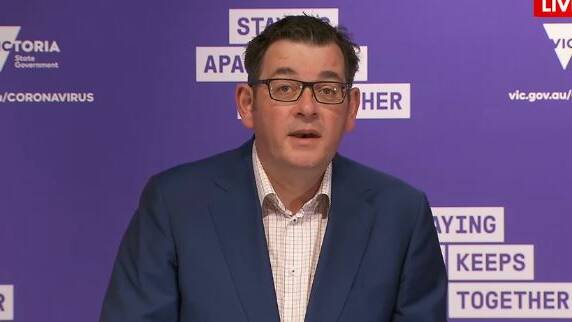
Victoria's abattoirs and meat processing plants will have to scale back to two-thirds of production, under stringent new state government coronavirus regulations.
Subscribe now for unlimited access to all our agricultural news
across the nation
or signup to continue reading
On Sunday, the government declared a state of disaster, imposing stage four restrictions for Melbourne and stage three for the rest of Victoria.
Officials on Monday announced Victoria had recorded 429 new cases of coronavirus since Sunday, with the total now sitting at 11,937.
- 148 cases have been linked to Bertocchi Smallgoods in Thomastown
- 129 cases have been linked to Somerville Retail Services in Tottenham
- 86 cases have been linked to JBS in Brooklyn
- 77 cases have been linked to Australian Lamb Company in Colac
- 20 cases have been linked to Golden Farms Poultry in Breakwater
Meatworkers will have to wear full personal protective equipment, including gloves, gowns, masks and shields.
Employees will also have to work split shifts and not be allowed to travel to different sites.
"We know that meatworks are a really significant challenge for us, whether it be lamb, poultry, or beef," Mr Andrews said.
"They will move to two-thirds production, reducing their production by one third."
There are about 56 livestock and poultry abattoirs in Victoria.
Read more:
The meat supply chain includes meat processing, smallgoods manufacturing, wholesaling and cold logistics.
Australian Meat Industry Council chief executive Patrick Hutchinson said the organisation had been lobbying tirelessly on its member's behalf to ensure they remained an essential service in the supply of food.
"The impact of these restrictions in Victoria, AMIC believes, will lead to a 30 percent reduction in supply chain throughput overall, based on discussions with our membership," Mr Hutchinson said.
"It is our opinion that this will lead to a reduction in saleable meat in the Victorian community."
Mr Andrews said abattoirs and meat processing plants would operate very differently, for the next six weeks.
"There will be some of the most stringent safety protocols that have ever been put in place, in any industrial setting," he said.
"Those workers will essentially be dressed as if they were a health worker."
Mr Andrews said staff would be working at one site only, and be temperature checked and tested.
"It is a proportionate response, to the risk that industry poses."
But given their critical role in keeping Victoria, and the nation fed, it was not possible to go below the two-third production level.
Mr Andrews said it was a less busy time for abattoirs, than in spring.
"That would be a very different set of circumstances," he said.
The government had decided to apply the stringent restrictions to all Victoria abattoirs.
"There will be COVID-Safe plans for all industries, particularly those that are at higher risk," Mr Andrews said.
"You can't have a situation where such a high risk environment is operating under two different sets of rules, in two different parts of the state, that will only contribute to further outbreaks," he said.
"It would only mean we were moving the problem from where it currently is into communities where it has not been."
Cedar reopens
Cedar Meats has been given the all clear to reopen, after closing when a staff member tested positive.
A spokeswoman said all staff were tested for COVID-19 between July 31 and August 2.
The results showed there was no transmission of COVID at Cedar Meats.
"Cedar Meats' Management welcome the announcement by the government relating to extra safety measures for abattoirs - specifically the medical level PPE, staggering shifts and breaks, temperature checks on entry," the spokeswoman said.
"Cedar Meats already has these measures in place and believes these latest test results show that these measures work."
Australian Lamb Company, Colac, remains closed.
Spare capacity
Thomas Elder Markets analyst Matt Dalgleish said a one-third reduction in production would be of a similar magnitude to the fall to that in the US, in April, although the impact there was more widespread.
"US cattle sector dropped production by about that amount in April and resulted in a 20 per cent fall in finished cattle prices and a 100pc rise in beef cut out prices at the wholesale level," Mr Dalgleish said.
"But I don't think it will be extreme as that for Victoria, in terms of price impact, as there are still abattoirs operating in other states that can pick up the slack.
There was also some capacity, in the system.
For cattle in Victoria, the slaughter number peak, over the last five years, had been around 34,000 head per week.
"Last week it was 16,000 (52 per cent below the peak) and the average so far during 2020 has been about 23,000 a week, or 32pc below the peak," Mr Dalgleish said.
He said he felt the government's actions were neccessary, to get on top of the spread of coronavirus.
"At least it's during winter," he said.
And the Australasian Meat Industries Employees Union has confirmed JBS was shipping cattle, to its Longford plant, Tasmania, for processing.
The AMIEU's Tasmanian state secretary Andrew Foden said JBS had started bringing cattle to Longford, when its Brooklyn plant closed the first time.
Read more:
JBS is also moving Victorian cattle to Scone, NSW, and SA for processing.
He said the Longford plant was now operating five days a week, although the company had planned to cut back to four days, in mid-August.
"The Victorian cattle have kept the five day trade going, here in Tasmania," Mr Foden said
"The workers are also going through an extreme amount of overtime, at the moment.
"We are lucky we have that 200 kilometres of water, it's kept us coronavirus safe."
JBS and the Australian Meat Industry Council have been contacted for further comment.
Have you signed up to Stock & Land's daily newsletter? Register below to make sure you are up to date with everything that's important to Victorian agriculture.


